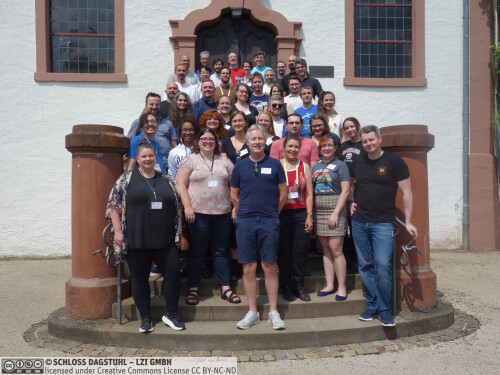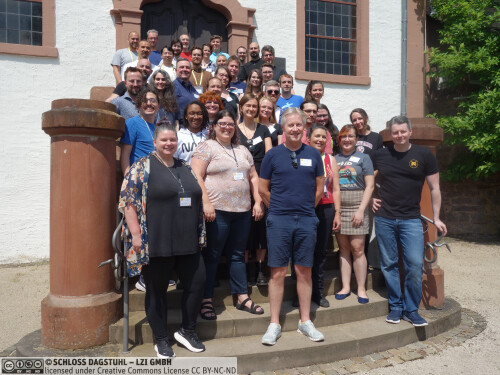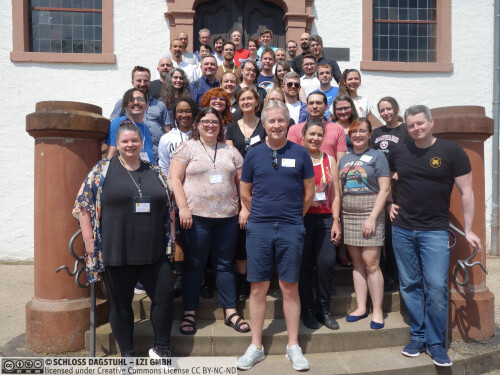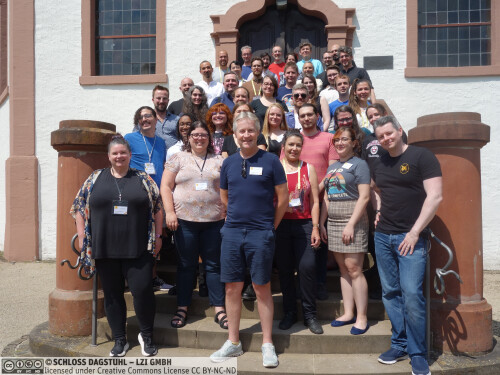Dagstuhl Seminar 24261
Computational Creativity for Game Development
( Jun 23 – Jun 28, 2024 )
Permalink
Organizers
- Duygu Cakmak (Creative Assembly - Horsham, GB)
- Setareh Maghsudi (Ruhr-Universität Bochum, DE)
- Diego Perez Liebana (Queen Mary University of London, GB)
- Pieter Spronck (Tilburg University, NL)
Contact
- Marsha Kleinbauer (for scientific matters)
- Simone Schilke (for administrative matters)
Shared Documents
- Dagstuhl Materials Page (Use personal credentials as created in DOOR to log in)
- The 2024 Procedural Content Generation Workshop Round-up | AI and Games Newsletter 03/07/24 by Tommy Thompson on July 3, 2024.
- AI and Games Summer School Round-Up | AI and Games Newsletter 26/06/24 by Tommy Thompson on June 26, 2024.
Developments in artificial intelligence are currently dominated by deep learning technology, which generates deep neural networks, trained on large data sets, which excel at pattern recognition. Variants of the "classic" deep neural networks have the ability to generate new data with statistical properties similar to the training set. Generative Adversarial Networks (GANs), such as those used by DALL-E and Midjourney, may be used to generate original visual artworks based on a textual description of the desired output. Autoregressive language models, such as those used by ChatGPT, use deep learning to produce text that is often indistinguishable from human-created text. Moreover, artificial intelligence techniques have been used to successfully generate music for many years, and researchers have also experimented with using deep learning to create cooking recipes, personalized fragrances, fashion, and more.
Despite the sometimes astonishing products of such creative artificial intelligence, the results are usually lacking in meaning. While DALL-E and Midjourney produce images that seem impressive, upon further inspection they contain many mistakes which humans would avoid. While ChatGPT can generate human-sounding text in a conversation, it often produces utter nonsense, and cannot write an original coherent story. And, as our own explorations of such techniques during Dagstuhl Seminar 22251 showed, GANs may produce computer game content which looks reasonable at first glance, but is ultimately neither functional nor playable.
While the product of creative artificial intelligence can often be used as a strong basis for humans to build upon, and may as such speed up the creative process, human intelligence and human creativity are almost always a necessary ingredient of the creative process. Moreover, the more relevant the meaning, purpose, and functionality of the product are, the less the creative process benefits from the involvement of artificial intelligence.
Game design and implementation are tasks which require a high amount of creativity, and which must lead to products which require a high amount of fine-tuned functionality. For example, a game "level" should not only look appealing, it should also be playable (i.e., it must be possible for most players to finish the level) and it should be interesting to play (i.e., the player should feel entertained by playing the level and should experience inherent motivation to finish the level). These are not features which can be acquired simply by "training on big data," which is what most developments in modern artificial intelligence are based on.
The goal of Dagstuhl Seminar 24261, Computational Creativity for Game Development, was to investigate to what extent modern artificial intelligence techniques can produce meaningful and functional game content, and what changes to or extensions of these techniques can improve this AI-driven creative process.
- Procedural Content Generation for Games: Procedural Content Generation (PCG) systems include techniques and methods able to create different types of game elements, such as levels, rules, quests, and characters, among many others. Research in PCG has been prolific in the last decade, but its presence in the games industry is still far from ubiquitous. A particular interest is set on mixed-initiative systems, which give designers and artist authorial control of the created content and the direction of the algorithm that generates it.
- Procedural Generation of Games: An extension of the previous point that deserves its own separate area is the generation of complete games. Same as recent advances in generative systems for music, painting, and long bodies of text, one can research how complete games can be generated from scratch. This includes elements like art, rules, characters, and winning and losing conditions that normally form a game. Automatic generation of new mini-games can open an interesting space of research that merges multiple advances together, but also a useful tool for game designers that will be able to use the generated games as inspiration for new entertainment experiences.
- Computational Creativity for Narrative Games: A particular type of game that has become more popular in the last decade is that of narrative games. While there has been some work in using computational creativity methods to generate texts, the adaptation of these techniques to the game development process remains an open area of research.
- Automatic Generation of Art in Games: Art is an important part of digital games and takes multiple forms: 3D-models, textures, visual effects, animations, cut-scenes, and so on. Lately, multiple advances on the use of computational creativity have shown the capacity of generating different forms of art, such as images, videos, and even 3D geometries. Examples of systems that generate art are DALL-E, Stable Diffusion, and Midjourney. Research can explore how these and other techniques can be used to generate art for games, including unexplored game art areas, in particular with regards to how this generation can be bound to specific games/genres/restrictions, how it can be integrated into the game development process, and how we can give designers authorial control and modification capabilities over the generated assets.
- Procedural Generation of Audio for Games: An important part of automatic generation of content refers to audio. From audio effects (footsteps, heartbeats, weather) to complete sound tracks (background music, melodies, singers), including the generation of different voices for human and non-human game characters, the space for computational creativity to generate this type of art is vast.
- Computational Creativity for Game Playing: An unexplored aspect and application of computational creativity is that of generating AI agents that play a game. Traditionally, the objective that leads AI agents in a game to play is to achieve victory, either by reaching a winning state or by maximizing the score they obtain in the game. Some efforts have been made to employ quality-diversity methods to generate different styles of play. Research may explore how we can harness the new developments in computational creativity to generate diverse play styles, including the generation of new strategies or tactics to play games in a different manner.
- Computational Creativity for Affective Computing: Affective computing is a discipline that bridges several domains, such as computer science, cognitive science, and psychology. It studies the implementation of systems that are able to express, identify, process, and simulate human affects. Research may investigate computational creativity algorithms and methods to provide non-player characters with the possibility of expressing feeling and emotions in a convincing way. This includes, for example, facial expressions and body animations, and it can be applied to human or non-human characters.
- Automatic Support of Game Development: Traditionally, computational creativity and the automatic generation methods have focused their efforts on generating the product that creative industries build -- be this games (or content for games), art or music, among others. These methods may also be used to aid the process of game development. Examples of the application of this technology include computational creativity for automation of tasks, algorithms for automatic testing of development process (such as code, integration, animations and deployment), production chains, and procedural development processes.
- Ethical Considerations of Computational Creativity: The ethical challenges of using computationally creative tools for applications such as game development should not be ignored. The use of automatically-creative tools may have negative effects on the need for artists and designers. Moreover, the automatic creation of games and game content may lead to ethically suspect products. Finally, biases that exist in art and data may be magnified when such products are used to automatically generate new products. These ethical considerations were taken into account in all our explorations of advances in computational creativity.
More than a year-and-a-half passed between writing the proposal and running the seminar. We found it striking how many advancements had been made in the area of Computational Creativity for Games in that period. During the writing of the proposal we were personally convinced that we were proposing an important theme for the seminar. When the seminar took place, we knew that no other theme was this topical.
This seminar was organized around workgroups, which worked in teams and topics proposed by the participants of the seminar in the areas outlined above. These workgroups were accompanied by plenary sessions for group formation, topic debate, and discussions of the deliberation of each group. Workgroups were dynamic, so participants could move between them, and new groups were formed during the week.
A Discord server was set up for coordination and announcements, and it was also used by the different groups for document and link sharing. This also has the benefit of providing a place for discussions after the seminar, easing the communication and further work among the members of each workgroup.
42 participants accepted our invitation to join the seminar; 40 of them attended. The participants were a good mixture of gender, country of origin, junior and senior seniority, and academia or industry. All participants engaged intensively within the seminar, and many expressed how happy they were with what we accomplished, making the seminar a great success.
 Pieter Spronck, Duygu Cakmak, Setareh Maghsudi, and Diego Perez Liebana
Pieter Spronck, Duygu Cakmak, Setareh Maghsudi, and Diego Perez Liebana
Developments in artificial intelligence are currently dominated by the deep learning technology, which generates deep neural networks, trained on large data sets, which excel at pattern recognition. Variants of the “classic” deep neural networks have the ability to generate new data with statistical properties similar to the training set. Generative Adversarial Networks (GANs), such as used by DALL-E and Midjourney, may be used to generate original visual artworks based on a textual description of the desired output. Autoregressive language models, such as used by ChatGPT, use deep learning to produce text that is often indistinguishable from human-created text. Moreover, artificial intelligence techniques have been used to successfully generate music for many years, and researchers have also experimented with using deep learning to create cooking recipes, personalized fragrances, fashion, and more.
Despite the sometimes astonishing products of such creative artificial intelligence, the results are usually lacking in meaning. While DALL-E and Midjourney produce images that seem impressive, upon further inspection they contain many mistakes which humans would avoid. While ChatGPT can generate human-sounding text in a conversation, it often produces utter nonsense, and cannot write an original coherent story. And, as our own explorations of such techniques during Dagstuhl Seminar 22251 showed, GANs may produce computer game content which looks reasonable at first glance, but is ultimately neither functional nor playable.
While the product of creative artificial intelligence can often be used as a strong basis for humans to build upon, and may as such speed up the creative process, human intelligence and human creativity are almost always a necessary ingredient of the creative process. Moreover, the more relevant the meaning, purpose, and functionality of the product are, the less the creative process benefits from the involvement of artificial intelligence.
Game design and implementation are tasks which require a high amount of creativity, and which must lead to products which require a high amount of fine-tuned functionality. For example, a game “level” should not only look appealing, it should also be playable and it should be interesting to play. These are not features which can be acquired simply by “training on big data”, which is what most developments in modern artificial intelligence are based on.
The goal of this Dagstuhl Seminar is to investigate to what extent modern artificial intelligence techniques can produce meaningful and functional game content, and what changes to or extensions of these techniques can improve this AI-driven creative process. This seminar will bring together scientists, researchers, and industry professionals (both junior and senior) who specialize in Artificial Intelligence, Computational Creativity, Procedural Content Generation, and Game Development. The seminar will mostly focus on working groups, where small groups of participants work on a particular topic for half-a-day or a full day. This exploration may consist of a discussion or of the building of a prototype, but should always produce some results. The collaboration between scientists and industry professionals should lead to products which progress the state-of-the-art in computational creativity.
 Duygu Cakmak, Setareh Maghsudi, Diego Perez Liebana, and Pieter Spronck
Duygu Cakmak, Setareh Maghsudi, Diego Perez Liebana, and Pieter Spronck
Please log in to DOOR to see more details.
- Maren Awiszus (Viscom AG - Hannover, DE) [dblp]
- Gabriella A. B. Barros (modl.ai - Maceio, BR) [dblp]
- Paolo Burelli (IT University of Copenhagen, DK) [dblp]
- Duygu Cakmak (Creative Assembly - Horsham, GB) [dblp]
- Filippo Carnovalini (VU - Brussels, BE) [dblp]
- Alex J. Champandard (creative.ai - Wien, AT) [dblp]
- M Charity (New York University, US) [dblp]
- Michael Cook (King's College London, GB) [dblp]
- João Miguel Cunha (University of Coimbra, PT) [dblp]
- Alena Denisova (University of York, GB) [dblp]
- Alexander Dockhorn (Leibniz Universität Hannover, DE) [dblp]
- Anders Drachen (University of Southern Denmark - Odense, DK) [dblp]
- Manuel Eberhardinger (Hochschule der Medien - Stuttgart, DE) [dblp]
- Raluca D. Gaina (Tabletop R&D - London, GB) [dblp]
- James Goodman (Queen Mary University of London, GB) [dblp]
- Christian Guckelsberger (Aalto University, FI) [dblp]
- Greta Hoffmann (TH Köln, DE)
- Amy K. Hoover (NJIT - Newark, US) [dblp]
- Chengpeng Hu (Southern Univ. of Science and Technology - Shenzen, CN) [dblp]
- Leonie Kallabis (TH Köln, DE) [dblp]
- Ahmed Khalifa (University of Malta - Msida, MT) [dblp]
- Antonios Liapis (University of Malta - Msida, MT) [dblp]
- Simon M. Lucas (Queen Mary University of London, GB) [dblp]
- Setareh Maghsudi (Ruhr-Universität Bochum, DE) [dblp]
- David Melhart (University of Malta - Msida, MT) [dblp]
- Gwaredd Mountain (Square Enix Limited - London, GB)
- Matthias Müller-Brockhausen (Leiden University, NL) [dblp]
- Mirjam Palosaari Eladhari (Stockholm University, SE) [dblp]
- Diego Perez Liebana (Queen Mary University of London, GB) [dblp]
- Johanna Pirker (LMU München, DE) [dblp]
- Mike Preuß (Leiden University, NL) [dblp]
- Emily Short (Oxford, GB) [dblp]
- Hendrik Skubch (Square Enix AI & ARTS Alchemy Co. Ltd. - Tokyo, JP)
- Gillian Smith (Worcester Polytechnic Institute, US) [dblp]
- Tristan Smith (Creative Assembly - Horsham, GB)
- Pieter Spronck (Tilburg University, NL) [dblp]
- Anne Sullivan (Georgia Institute of Technology - Atlanta, US) [dblp]
- Tommy Thompson (AI and Games - London, GB) [dblp]
- Tony Veale (University College Dublin, IE) [dblp]
- Vanessa Volz (CWI - Amsterdam, NL) [dblp]
Related Seminars
- Dagstuhl Seminar 12191: Artificial and Computational Intelligence in Games (2012-05-06 - 2012-05-11) (Details)
- Dagstuhl Seminar 15051: Artificial and Computational Intelligence in Games: Integration (2015-01-25 - 2015-01-30) (Details)
- Dagstuhl Seminar 17471: Artificial and Computational Intelligence in Games: AI-Driven Game Design (2017-11-19 - 2017-11-24) (Details)
- Dagstuhl Seminar 19511: Artificial and Computational Intelligence in Games: Revolutions in Computational Game AI (2019-12-15 - 2019-12-20) (Details)
- Dagstuhl Seminar 22251: Human-Game AI Interaction (2022-06-19 - 2022-06-24) (Details)
Classification
- Artificial Intelligence
- Human-Computer Interaction
- Multimedia
Keywords
- computational intelligence
- artificial intelligence
- computational creativity
- game design
- game development





 Creative Commons BY 4.0
Creative Commons BY 4.0
